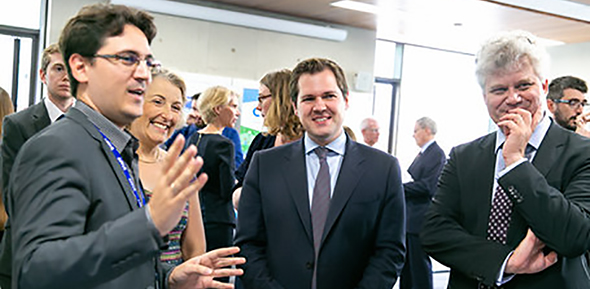Robert Jenrick MP, Exchequer Secretary to the Treasury, launched the Digital Framework Task Group (DFTG) during his visit to the University of Cambridge.
We were delighted to welcome the Minister and his team from the Treasury. It provided an opportunity to show him some of the technologies and tools currently being developed by world-leading researchers here at the University. These technologies will help drive smarter information and deliver whole-life value offered by digital infrastructure and construction.
Dr Jennifer Schooling
Addressing an invited audience at the Department of Engineering recently (19 July), the Minister acknowledged the Government’s response to the National Infrastructure Commission’s (NIC) ‘Data for Public Good Report’, that tasks the Centre for Digital Built Britain (CDBB) with the creation of the DFTG to draw together key organisations and initiatives to steer and guide the successful development and adoption of a digital framework for infrastructure data.
The Minister revealed that the CDBB – a partnership between the Department of Business, Energy & Industrial Strategy and the University of Cambridge – will deliver key recommendations from the NIC report. The CDBB has been set up to support the transformation of the construction sector using digital technologies to better plan, build, maintain and use infrastructure. He also announced that Mark Enzer, Chief Technology Officer at Mott MacDonald, will chair the newly formed DFTG.
Outlining government commitment to supporting transformation to digital construction and infrastructure, the Minister said: “The DFTG will advise on how we can set common standards and tear down barriers to data sharing, all to increase the efficiency of construction projects and deliver high-performing infrastructure fit for the 21st century.
“In our current plans, through the Transforming Infrastructure Performance programme, we already commit to using data and technology to transform the way we build and manage infrastructure. We have made it clear that we want to develop ‘smarter construction’ through the use of modern manufacturing techniques. But we also agree with the National Infrastructure Commission that we can and must go further. There is vast bank of data on the UK’s infrastructure which, thanks to an increasing array of sensors and gadgets, expands by the day. But too often this is not being used in a strategic, joined-up way which limits our potential.”

From left, Dr Haris Alexakis, CSIC Research Associate, Dr Jennifer Schooling, Director of CSIC, Exchequer Secretary to the Treasury, Robert Jenrick (MP) and Professor Andy Neely, Director of CDBB.
The Minister, who was accompanied by his team from the Treasury, made reference to the UK’s productivity challenge and historical underinvestment in infrastructure, but emphasised government commitment to supporting innovation to enable the transformative power of data in the delivery of infrastructure.
He said: “We know that warm words won’t be enough to affect the change that we need. That’s why, at the last Budget, we announced a new £170 million Industrial Strategy Challenge Fund to support innovation and transform productivity in the construction sector.
“Up to £72 million of this fund will be invested to establish a new Innovation Hub; a consortium of the brightest minds and innovators in this space. It will help develop and commercialise digital and manufacturing technologies – turning our world-renowned research towards practical application for projects on the ground. Professor Sir Mark Walport is overseeing the rigorous competitive process and I look forward to the winning bid being announced very soon.”
The visit, hosted by the Cambridge Centre for Smart Infrastructure and Construction (CSIC) and CDBB at the James Dyson Building – the University’s first ‘smart’ building, which is instrumented with a CSIC fibre optic sensor system – showcased a range of innovative and emerging technologies from a number of the University’s schools and research centres.
Dr Jennifer Schooling, Director of CSIC and Director of the CDBB Research Bridgehead, and Professor Andy Neely, Director of CDBB, introduced the Minister to researchers who demonstrated a range of innovative and emerging technologies including: machine learning and artificial intelligence (AI) for the built environment; autonomous image recapture using drones and computer vision techniques; the CDBB digital twin project; Microsoft HoloLens demonstration; acoustic sensing; a self-sensing bridge; and fibre optic sensors demonstrated at the CSIC lab.
The Minister also met with some of the social scientists, computer scientists and engineers from a number of centres and schools across the University including CSIC, CDBB, the Laing O’Rourke Centre for Construction Engineering and Technology, Cambridge Centre for Housing and Planning Research and CSIC spin-out company Epsimon.
Dr Schooling said: “We were delighted to welcome the Minister and his team from the Treasury to CSIC HQ. It provided an opportunity to show him some of the technologies and tools currently being developed by world-leading researchers here at the University. These technologies will help drive smarter information and deliver whole-life value offered by digital infrastructure and construction.”
The first official meeting of the DFTG will take place in September.
This article has been edited from the CSIC website.

